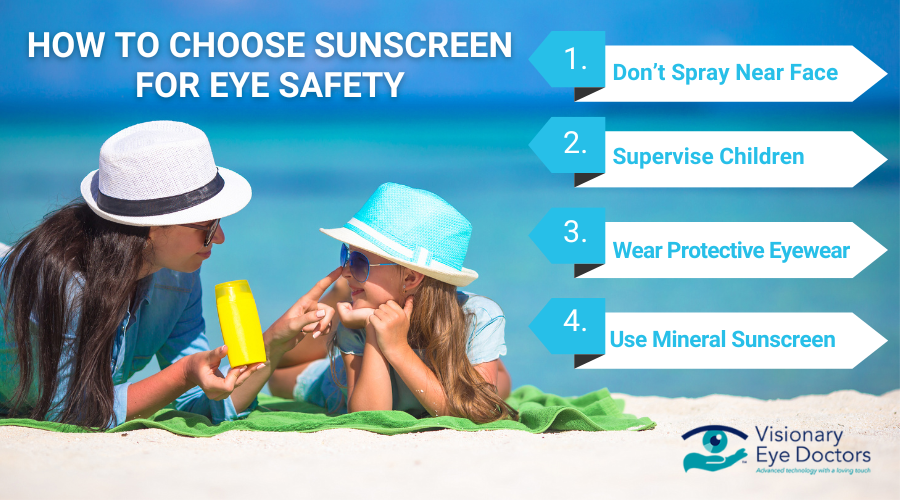Summer Fun and Eye Health Safety
Summer is a season filled with vibrant outdoor activities, from beach outings to long, sunlit walks. However, amidst all the fun, it’s crucial to consider eye health safety to ensure the season remains enjoyable without any mishaps. If you find yourself with sunscreen in your eyes, follow these quick steps for relief:
- Remove Contact Lenses: If you are wearing contact lenses, remove them immediately to prevent further irritation and to allow thorough rinsing of the eyes.
- Wipe Excess Sunscreen: Carefully wipe around your eyes with a soft cloth to remove any excess sunscreen. Avoid touching the eye directly to prevent additional irritation.
- Flush Your Eyes: Hold your eye open under a stream of cool, clean water, or use a saline solution for at least 15 minutes. Blink regularly to help expel the sunscreen from your eye naturally.
- Apply Eye Drops: After flushing, use lubricating eye drops that do not contain preservatives to soothe irritation. These drops can be applied every hour as needed to relieve discomfort.
- Rest Your Eyes: Avoid using contact lenses and minimize exposure to bright sun for at least 48 hours after the incident to allow your eyes to recover fully. You can also apply a cold compress to constrict swollen blood vessels and relieve pain.
By following these steps, you can quickly address the discomfort of sunscreen in your eyes and get back to enjoying your summer safely. With those tips in mind, let’s hop into some other considerations for your eye health this summer!
Understanding the Risks of Sunscreen in Your Eyes

Sunscreen is vital for protecting our skin from the harmful effects of UV rays, but it can be a source of discomfort and potential harm when it gets into our eyes. Here’s what you need to know about the risks associated with sunscreen in your eyes and how to mitigate them:
- Chemical Irritants: Many sunscreens contain chemicals like oxybenzone, avobenzone, and other active ingredients that can cause a burning sensation or temporary visual disturbance when they come into contact with the eye’s delicate tissues.
- Allergic Reactions: Individuals with sensitive skin may experience allergic reactions not just on their skin but also in their eyes. Ingredients in some chemical sunscreens can trigger redness, swelling, and intense irritation.
- Potential for Permanent Damage: While rare, prolonged exposure to certain sunscreen chemicals without proper rinsing can lead to more severe eye conditions, such as corneal abrasion or permanent damage to the eye’s surface. It is worth noting the Poison Control Center and the Food and Drug Administration have no documented cases of sunscreen causing permanent damage.
- Protection Strategies: To minimize the risk, always apply sunscreen carefully around the eyes, use formulations labeled as non-irritating or designed for sensitive skin, and consider the use of physical barriers such as UV-blocking sunglasses and wide-brimmed hats.
- Immediate Action is Crucial: If sunscreen does get into your eyes, immediate flushing with clean water or a saline solution is crucial to remove the irritant and reduce the risk of any long-term damage.
Understanding these risks and how to respond effectively can help ensure that your vision remains unimpacted as you enjoy the sunny days of summer.
How to Choose the Right Sunscreen for Eye Safety

Selecting the right sunscreen is essential not only for skin protection but also for preventing discomfort and damage to the eyes. Here are some preventative measures to ensure you choose and apply sunscreen in a way that keeps your eyes safe:
- Avoid Spraying Near the Face: Never spray sunscreen directly on your face. Instead, spray it onto your hands and then apply it to your face to control the application and prevent it from getting into your eyes.
- Supervise Children: Children are more likely to rub their eyes, so it’s important to supervise their sunscreen application. Apply sunscreen for them, ensuring it’s well away from a child’s eyes.
- Secure Sunscreen Storage: Always keep sunscreen out of reach of children to prevent accidental contact with their eyes.
- Thorough Application: Rub sunscreen in completely to prevent it from running into the eyes, especially if you sweat or swim.
- Avoid Eye Area: Be cautious when applying sunscreen around your eyes. Consider using sunscreen sticks for a more precise application that’s less likely to spread into the eyes.
- Wear Protective Eyewear: Large UV-blocking sunglasses will protect not just your eyes but also the sensitive skin around them from UV rays and accidental sunscreen exposure.
- Choose Mineral Sunscreens: Opt for mineral sunscreens containing titanium dioxide or zinc oxide. These are less likely to irritate the eyes and are generally safer for sensitive skin types.
- Look for Eye-Safe Labels: Some sunscreens are specifically formulated to be non-irritating and safe for use around the eyes. Look for products that are labeled as suitable for sensitive skin or are ophthalmologist-tested.
By following these preventative measures, you can enjoy the sun safely without compromising the health and comfort of your eyes.
Other Summer Eye Health Considerations

Summer is not only about sun protection; several other factors can impact eye health during the warmer months. Here are additional considerations to keep in mind:
Chlorine and Pool Water
- Protection from Chlorine: Swimming pools can be tough on your eyes due to chlorine, which can strip away the tear film that protects your eyes, leading to dry eyes and irritation. Wear watertight goggles while swimming to protect your eyes from chlorine.
- Post-Swim Care: Always rinse your eyes with fresh, clean water after swimming in a chlorinated pool to restore moisture and remove any residual chlorine that could cause discomfort.
Salt Water and Ocean Safety
- Natural Irritants: Ocean water contains natural salts and biological matter that can irritate your eyes. Like with pools, wearing goggles while swimming in the ocean can prevent irritation.
- Rinse After Swimming: Make it a habit to rinse your eyes with fresh water immediately after swimming in the ocean to remove salt and other irritants.
UV Exposure and Pterygium
- Long-Term Sun Damage: Extended exposure to UV rays can lead to pterygium, a growth on the eyeball that can obstruct vision. This is particularly common among surfers and those who spend a lot of time in sunny, sandy, or windy environments.
- Proper Eye Protection Measures: Wear UV-blocking sunglasses or a wide-brimmed hat that covers the entire eye area. Ensure your sunglasses meet the recommended UV protection standards to effectively shield your eyes from ultraviolet radiation.
Reflective Surfaces and Snow Blindness
- Reflection from Surfaces: Water, sand, and other reflective surfaces can increase UV exposure dramatically, potentially leading to photokeratitis, also known as snow blindness.
- Appropriate Eyewear: Use sunglasses with a wrap-around design to protect against UV rays coming from different angles. This is especially important in environments with high glare, such as beaches or snowy areas.
By taking these specific precautions, you can protect your eyes from common summer hazards and enjoy the season without compromising your eye health.
Visionary Eye Doctors and Your Eye Health
As we soak up the summer sun and partake in seasonal activities, it’s vital to ensure that our eye health remains a top priority. At Visionary Eye Doctors, we combine medical expertise with genuine kindness, offering both advanced technology and personalized care to address your unique eye health needs. Whether you’re dealing with minor irritations from sunscreen or more complex conditions, our skilled team is ready to provide the highest level of care.
We emphasize the importance of preventative care and patient education to help you understand the risks associated with sun exposure and the best practices for eye safety. By providing tailored advice on everything from the selection of UV-blocking sunglasses to proper eye hygiene, we aim to prevent eye health issues before they start.
We encourage everyone to visit our offices in Maryland or D.C. for a comprehensive eye exam. Regular check-ups are crucial for maintaining excellent eye health and can help detect and mitigate potential issues early. At Visionary Eye Doctors, we are committed to ensuring that your vision remains clear and protected, so you can continue to enjoy the beauty of summer without compromise.



